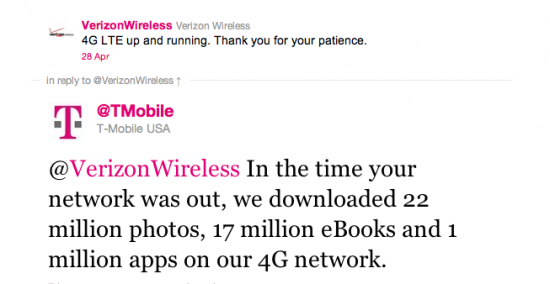The ongoing saga that is T-Mobile and Verizon trading barbs over Verizon’s proposed acquisition of SpectrumCo AWS spectrum has yet another round of news. Verizon’s accusing T-Mobile of hypocrisy in their attempts to block Verizon’s acquisition in light of T-Mobile’s efforts to join with AT&T to create the megacarrier to beat all megacarriers.
T-Mobile execs met with the FCC last week blasting Verizon’s proposed deal accusing Verizon of purchasing spectrum only to sit on it. T-Mobile highlighted Verizon’s existing AWS spectrum, which the company has sat on for nearly six years. T-Mobile all but accused Verizon of “hoarding airwaves” and keeping spectrum out of competitors’ hands.
Well, Verizon, Comcast, Time Warner and Bright House aren’t taking T-Mobile’s comments lying down. In a new letter to the FCC, they accuse T-Mobile of contradicting the very arguments it made last year to justify it’s $39 billion dollar acquisition by AT&T. Verizon says T-Mobile had no problem with two nationwide operators consolidating spectrum, but now it’s criticizing Verizon’s efforts on the same ground.
Verizon’s letter to the FCC:
T-Mobile now claims that there will be “serious harm to competition and to consumer welfare in the wireless market by permitting a dominant carrier to foreclose acquisition of spectrum by smaller rivals,” even though the transaction will not eliminate any competitors, will not combine businesses, and will not transfer any customers. In other words, despite its earlier claims that the combination of two top-four facilities-based providers would have no impact on competition in a fiercely competitive marketplace, T-Mobile now argues that the acquisition of a discrete block of spectrum – an only spectrum – by a carrier that needs to meet its customers’ escalating demand for mobile services will “serious[ly]” harm” competition.
… T-Mobile cannot continue to have it both ways, and its attempts to extract competitive advantages during the transaction review process should be disregarded.
In response, T-Mobile says:
[The cable operators have] not raised anything new that has not already been addressed by T-Mobile in this proceeding. Their hodgepodge of complaints is simply a smokescreen to try to hide the serious anticompetitive impacts that would result from this highly problematic transaction. The FCC’s focus must be on whether vigorous competition will continue following this spectrum transaction between Verizon and the cable companies. T?Mobile USA and many other parties have demonstrated that the long-term result would be less competition if Verizon is allowed to warehouse the last swath of spectrum likely to be available in the near term to provide meaningful nationwide competition in mobile broadband.
The question of who is right and who is wrong here is pertinent, but not as relevant as the concern that while the companies duke it out, the consumers lose. There is a spectrum shortage in this country and in order for us to finally see carriers build out their networks to the point where dropped calls and lost data connections are a minimum, something has to be done. Until then, I’ve got popcorn, this cage match between T-Mobile and Verizon is getting good.

